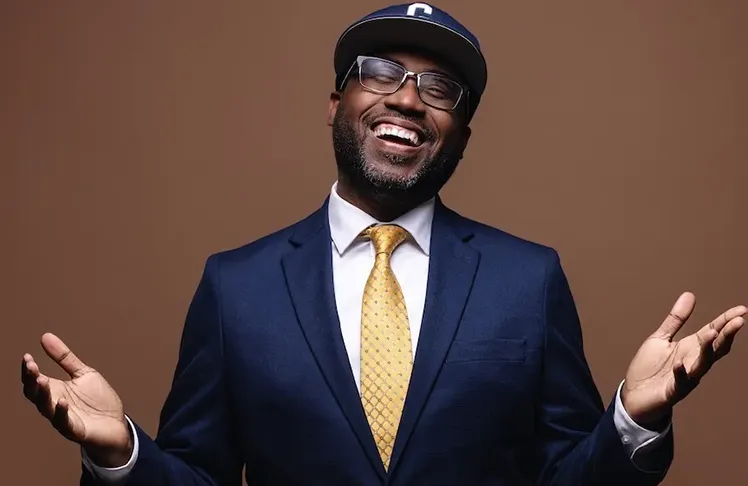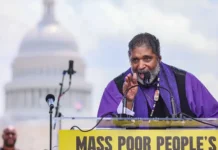
In Baltimore’s Govans neighborhood, what started as a simple vegetable garden beside Pleasant Hope Baptist Church has grown into a nationwide movement of more than 230 congregations fighting food insecurity through self-sufficiency. And at the center of this transformation stands Rev. Dr. Heber Brown III, a third-generation preacher who’s reinventing how Black churches address hunger in their communities.
“If we embrace and renew our ability to feed ourselves, it will have an outreaching effect in so many other areas of our industry,” Brown says.
He started the Black Church Food Security Network (BCFSN) in 2015 with a revolutionary premise: rather than merely distributing food, churches can help their communities grow it. His vision extends beyond immediate hunger relief to rebuilding lost connections between people and land.
The network “co-creates Black food ecosystems anchored by Black churches working in partnership with Black farmers and other organizations,” tackling a crisis that disproportionately affects Black Americans.
Recent data from the Food Research & Action Center underscores the urgency of this work. While one in seven U.S. households faces food insecurity, the rate for Black households (23.3%) is more than double that of white households (9.9%). An estimated 13.8 million children lived in food-insecure households in 2023, marking a 3.2% increase from the previous year.
”The Black Church Food Security Network has been an invaluable partner in helping our church to establish a vegetable garden,” said Rev. Dr. Sammie Logan III, pastor of New Hope Baptist Church in Chesapeake, Virginia, “that has energized members of our church and deepened our relationship with residents of our community.”
The seeds of this movement were planted through a personal connection. Maxine Nicholas, a grandmother in Brown’s congregation, reminded him of his own childhood experiences gardening with his grandmother Geraldine. This remembrance sparked the initial church garden project, which quickly evolved beyond simply growing vegetables.
Read on to find out what else Brown told us about the network.
Word In Black: What do you want people to know about the Food Network?
Rev. Heber Brown: Our ability to feed ourselves is connected to so many of the other aspirations and dreams that we have as a community. It literally helps to create the runway and open the door for economic opportunity, for improved health outcomes, for youth and young adult mentoring and apprenticeships, for supporting our families with respect to heirs’ property and ensuring that family legacies remain long into the future.
There are so many different avenues this work can support. It’s important to me that people know this is not just an effort for people with a green thumb. But in actuality, we see food as the necessary runway for our collective empowerment. And if we could all find whatever lane this work attracts us to and just put all hands on deck to do this, so many other things will come.
WIB: You’re a Maryland guy. Where’d you get your love for the earth?
HB: I am old enough to remember spending the summers down the country when school let out. For us, my maternal line of my family is in rural Virginia, a little town called Kilmarnock, Virginia, in Northumberland County. And my Momma Geraldine lived in one of those houses that sat like a mile off the main road.
Some of my most vivid memories of summer are tied to my experiences growing up under the care of my Big Momma.
She had a different idea of conservation because there was a well and the water had to be fetched. She made me, the preacher, and my brother Anthony, who’s now a worldwide known gospel music star, take a bath in the same bathtub and said, ‘y’all share that water because I’m not going back out to that well.’
Summers down in the country introduced me to a different rhythm of life. It brought me closer to the land. It brought me closer to farming and where our food came from. It was a real education beyond anything the classrooms had ever taught.
That experience is not the norm for younger people coming up today; so I feel a particular obligation to be a part of the bridge that connects those experiences from yesteryear with the lived experiences of young people today. The urgency I feel is related to the fact that as the elders pass off the scene, if we don’t bridge that and do all we can to download that wisdom and those experiences into younger people, we will be a generation of Black people who do not have a collective of reference.
WIB: What are the young people missing without this frame of reference?
HB: It feels like for the first time what is beginning to emerge is a Black America that does not have that point of reference to land or farming or food, and perhaps is not even interested. If you’re selling grandma’s land down the country for a couple of dollars, and if you’re not appreciating fully what your daddy did in blood, sweat, and tears to get that land and pass it down to the children — if you sell it to Walmart or Costco or whatever big box store or somebody to make a parking lot, you don’t appreciate it.
WIB: Who were your role models?
HB: The first who comes to mind is Rev. Vernon Johns, who was preceded Dr. Martin Luther King Jr. as pastor of Dexter Avenue Baptist Church. He was a great preacher, theologian, all of that, religious leader, seminary president. He was also a farmer and set an example of growing food and selling his watermelons and produce at the church, I just preached in Brooklyn, New York, two weeks ago at the First Baptist Church of Crown Heights, and the pastor, in introducing me, said, ‘Family, I’m so glad to have one who I perceive to be the Vernon Johns of our generation.’
WIB: And you were smiling right? Who else?
HB: That’s high praise. Extremely high praise. It’s not the first time I’ve heard it. Another one is Rev. Albert Clegg and the Shrine of the Black Madonna. In the ’60s and ’70s, they were talking about the need for Black America to feed itself. They have more land — 4,000 acres in South Carolina —than any other Black church in the United States. They bought this land 24 years ago, right before the founder passed away. Because the founder had said Black America needed to control its own food sources and needed a mega farm. While they had church gardens, they had various local satellite congregations in Detroit, Atlanta and Houston, but he wanted something bigger for all of Black America.
WIB: And the third?
HB: Bishop Ida B. Robinson, who some call the first woman bishop in this country. Her congregation was based in Harlem and they purchased 144 acres of farmland in Southern New Jersey. And that land is still there as we speak as well.They would invite people in the cities to come stay on the land, some time in nature because Robinson was concerned during the Great Migration that our distance from the land was causing mental, emotional, and health-related challenges in us. And they would do convocation and baptism and everything else on the land, too.
WIB Last question. How did you summon the courage to follow your vision for your life rather than remain in a prevailing model of ministry?
HB: When I announced I was leaving the church, one of my deacons said, “Rev. Brown, I’m sad, but not surprised.” Because they’d seen me delivering sweet potatoes, driving a truck, singing, and doing videos. I had to pay attention to what made my heart sing, what made me smile. It was hard work. But it was doing something to really give me life and joy. And that can be contagious for whatever field. Once you find your thing, when people come around, they’re going to be drawn to it just because it’s really powerful when you align with your purpose.
Interview responses have been lightly edited for length and clarity.















